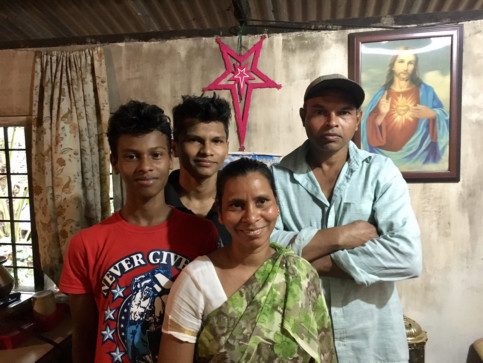
As Busu Nayak heads home after finishing his day’s work at Atsul Packers in Perumbavoor, Kerala, he stops at a nearby tea shop for chitchat and a bottle of milk. Other than his rustic features, there is nothing that sets this 50-plus man apart from his friends and colleagues. “Ithu ente Naadu pole aayi (This has become like my own place),” said Nayak in almost flawless Malayalam.
After moving to Kerala in 1998 from Phulbani village in Odisha, the migrant worker says he feels very much at home here.
His wife Manjulatha followed him in 2008 when communal violence flared up in Odisha. She works as a cleaner at a private hospital and earns Rs6,000 [Dh333] a month. For the last three years, their two sons Leoton, 11 and Dibyojith, 15, have also been attending school in Kerala. Their two-room dwelling on the first floor of a building with coarse cemented walls is dotted with trophies the boys have won in school sports competitions. “We have never felt like outsiders here. This place has given us a decent life and I am not even thinking of leaving,” said Nayak.
Dibyojith says he likes it in Kerala. “The school is good and I have lots of friends.” Dibyojith has also learnt to speak and write in Malayalam.
There are hundreds of families like the Nayaks who are building a new life in Kerala. The children of migrant workers who are born and brought up in Kerala are bearers of a fusion of identities. The demographic shift is most visible at the Government UP School Kandanthara in Perumbavoor, where out of the 117 students, as many as 112 are children of migrant workers. The school even has a special teacher Akthar-ul-Islam to teach students in their native language. “Migrant students started coming in huge numbers since last three or four years. It was also partly because of our literacy drive when it came to our notice that most of these kids were locked up inside their rooms when parents went to work. We convinced them to send their children to school,” said headmaster Baby George.
But initially local parents were not happy and did not want their wards to mix with the migrant kids. “That was expected. But we made a consistent effort to fight the prejudices and bring them together through joint awareness sessions,” said the headmaster.
He said most kids are picking up Malayalam quickly. “The kids have a sense of belonging here, and we cannot call them outsiders anymore,” said George.












